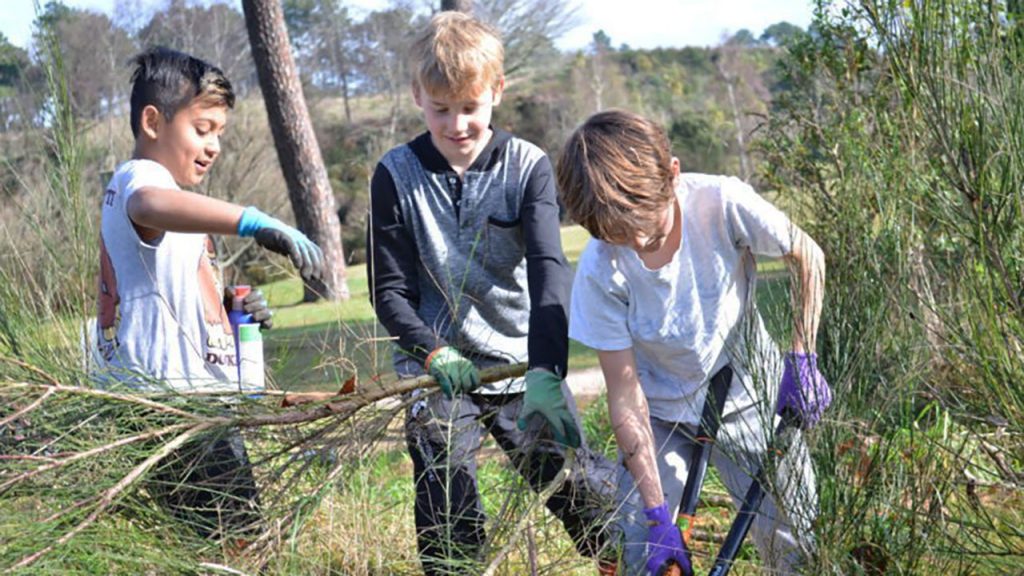
Kids Greening Taupō covers all components of restoration including weed eradication. Image: University of Auckland
The environmental education lecturer was the first from the University to present at a United Nations Academic Impact (UNAI) Hub webinar hosted by a college in Bangalore and attended by 350 school principals from all over India, as well as countries as diverse as Sri Lanka and Morocco.
Founded by UN Secretary-General Ban Ki-moon in 2010, the aim of the hubs is to align 17 tertiary institutions with one each of the 17 Sustainable Development Goals (SDGs), which range from no poverty to affordable and clean energy, and were agreed on by member states as a global blueprint for a better world in 2015. The University of Auckland has recently become the hub for the fourth goal, Quality Education, which means it will lead discussion and action on this issue globally.
In her presentation, Dr Birdsall talked about the connection between education and equitable societies and gave practical examples of how to embed a number of the goals into the school curriculum. She chose to showcase two projects close to home; Kids Greening Taupō and Papa Taiao Earthcare.
“The first gives Taupō rangatahi the opportunity not just to learn about, but take action to restore native biodiversity,” she says. “Kindergartens and schools ‘adopt’ an area in Taupō and work in partnership with the council and other organisations to trap and poison pests, remove noxious weeds and re-plant the area with native plants.”
The project also offers teachers workshops to increase their knowledge and build their confidence with including outdoor contexts in their lessons.
The Earthcare initiative connects students with enterprises that restore water, coastal or land ecosystems while gaining NCEA and industry-related qualifications and skills at the same time.
“In one course, for example, they learn how to build wire and electric fences as well as horticultural skills like raising plants from cuttings that can then be used to re-plant the riparian regions of farmers’ waterways once they’ve been fenced off,” she says.
As well as examples of worthwhile projects in Australasia, she also talked about environmental education initiatives that have incorporated the 17 goals in Swaziland, Canada, the US, Taiwan and India, and says the context of any environmental lesson is vital.
“Locating what you are teaching in your students’ community makes it local and relatable, which is as important as the way it’s taught.”
Feedback on Dr Birdsall’s session from the webinar’s host, the Kristu Jayanti College, itself a hub for the first goal (No Poverty), was overwhelmingly positive, with the principal saying her suggestions were “very practical and popular”.
If she could re-shape the whole education system, Dr Birdsall would put the study of environmental issues “front and centre”.
“This type of approach is quality education because it focuses on issues that are relevant to learners and set in their community, which makes it highly motivating,” she says.
“It also allows for collaboration with others in the community, it involves cognitive learning (about the issue and who is involved, as well as imagining possible futures), affective learning (reflecting on their own attitudes and values and developing hope for the future) and also kinaesthetic learning (practical/hands-on) where they make decisions and take action to solve a problem.”
And she says that while Covid-19 has been disastrous in so many ways, the outcome for the environment was at least briefly positive, with lockdown also offering a rare chance for many people to slow down.
“It was an opportunity for people to get outside and explore their neighbourhood on foot or by bike at a more leisurely pace, and to appreciate the natural world, which in turn, shifts the way we see ourselves and our place on Earth.”
Sally Birdsall teaches Primary Science at the University’s Faculty of Education and Social Work. Prior to this appointment, she taught at both primary and intermediate school levels.
A new report from the University of Auckland’s Our Voices Project asks young people what…
The government has opened a tender for new standardised assessment tests, leaving educators shocked and…
Early in her career, Kiri Turketo found inspiration in an unlikely source. In this Principal…
Real stories of dedication, challenges, and triumphs from educators in NZ. Part six comes from…
Is fast furniture impacting your school's environmental footprint? We explore eco-friendly solutions to reduce furniture…
A new report from the New Zealand Initiative argues we need a stronger and clearer…
This website uses cookies.